Choosing a career in ichthyology means deciding to study fishes, sharks, rays, sawfish, and more. Not everyone in the field chose their careers for the same reasons. here are some of the current and previous Museum ichthyologists’ stories.

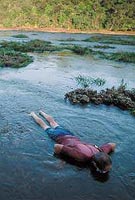 Larry Page
Larry Page
Curator of Fishes
What interesting discoveries have you made in your studies?
“I have discovered and described about 40 species of fishes previously unknown to science. I also have studied and described the breeding behaviors of several species of North American fishes and develop a system for classifying behaviors that has gained wide acceptance in the ichthyological community. In the process of studying breeding behaviors, I also discovered egg mimics in darters – structures that develop on males and look like eggs.”
How did you become interested in ichthyology?
“Probably two things: As a child I had several aquaria in which I kept tropical fishes, and my parents often took my sisters and me on camping trips. When we camped, I spent most of my free time walking along streams and trying to identify the fishes. Either or both of these experiences caused me to learn as much as I could about fish biology.”
What training and education do you have?
“Bachelor’s Degree in Biology, Master’s Degree and Ph.D. in Zoology, with a specialization in ichthyology.”
What personal qualities are important in this field?
“Probably most important is a love of nature and a curiosity about biological diversity.”
Describe your work and research:
“I am interested in the evolution and ecology of freshwater fishes. My students and I study specimens in museum collections to learn as much as we can about variation in fishes, and we conduct fieldwork to study how the various morphological traits adapt the fish to its particular lifestyle.”
What skills do you use on the job?
“The most obvious things are related to the laboratory examination of small fishes including the use of microscopes and dissection, and to fieldwork including knowing where various fishes can be found and how to catch them. It also is necessary to understand scientific literature and how to find the appropriate references.”
What interesting discoveries have you made in your studies?
“I have discovered and described about 40 species of fishes previously unknown to science. I also have studied and described the breeding behaviors of several species of North American fishes and develop a system for classifying behaviors that has gained wide acceptance in the ichthyological community. In the process of studying breeding behaviors, I also discovered egg mimics in darters – structures that develop on males and look like eggs.”
What is your typical work schedule?
“Ichthyology, like most science, is sufficiently interesting that we ichthyologists spend much of our time doing something related to our work, which often doesn’t really seem like work. Officially, we work from 8-5, M-F, like most people; unofficially, we probably work more like 60-80 hours per week.”
What do you like best about your job?
“The discovery of answers to perplexing problems in nature. E.g., how and why did egg mimics develop on the fins of male darters? The answer is that females choose to mate more often with males that have eggs in their nests rather than males that lack eggs, and by evolving egg mimics – structures that look like eggs, even males that have no real eggs in their nests are attractive to females.”
Does this profession require any travel?
“Yes. Often to pristine areas on other continents. Sometimes to museums in large cities.”
What is the general salary range for someone in your position?
“With a Ph.D., an ichthyologist makes $50,000-100,000/year.”
How long have you been an ichthyologist?
“32 years.”
Is it difficult to find a job in ichthyology?
“No. The training of ichthyologists seems to more or less keep pace with the availability of positions. However, obtaining a position in a large museum or prestigious university can be difficult.”
Have you ever considered a career in a different field?
“Only as a graduate student when I considered other areas of biology, including entomology and botany.”
Do you ever go fishing in your free time?
“If fishing means with a hook and line, no. If fishing means with a seine so that many small and interesting species as well as the larger more obvious ones are caught, yes, every chance I get.”
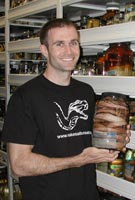 Robert H. Robins
Robert H. Robins
Ichthyology Collection Manager
Describe your work and research:
“My job as Ichthyology Collection Manager is largely to facilitate the science of those ichthyologists that use the UF Collection of Fishes. To that end, I am charged with directing the activities of others in the division such that the collection is well maintained, organized, and readily accessible to research ichthyologists. In many ways, a scientific collection of specimens functions much like a library. Scientists borrow fishes and obtain information from the specimens that is useful for interpreting what is actually going on in the real world.”
How did you become interested in ichthyology?
“Both my parents are ichthyologists. I have to assume that this had something to do with my career choice despite the presence of a very early, almost innate curiosity regarding fishes, reptiles and amphibians. My folks wouldn’t let me have a snake, so I had aquaria. It was probably a combination of both this natural interest in living things and the example my parents set (although they certainly never pressured me) that led me in this direction.”
What training and education do you have?
“I completed a B.A. at the University of Miami and an M.Sc. at the University of Florida. Most of my training as an ichthyologist has come in the field or the laboratory although, what you learn in the classroom or at scientific meetings is instrumental in helping you interpret your experiences as an ichthyologist.”
What personal qualities are important in this field?
“All scientists need to be able to communicate their ideas/findings/discoveries in an effective manner. Conducting day to day work or research it helps to be organized and patient. I find that when I feel the most overwhelmed by my work that the best remedy is for me to get organized (make a list) and take my time with each task/goal.”
Describe your work and research:
“My job as Ichthyology Collection Manager is largely to facilitate the science of those ichthyologists that use the UF Collection of Fishes. To that end, I am charged with directing the activities of others in the division such that the collection is well maintained, organized, and readily accessible to research ichthyologists. In many ways, a scientific collection of specimens functions much like a library. Scientists borrow fishes and obtain information from the specimens that is useful for interpreting what is actually going on in the real world.”
What skills do you use on the job?
“This job, like most, requires that I be proficient in the use of a personal computer. Chiefly, I use a computer to track our holdings of specimens and to communicate with other ichthyologists. Additionally, a large part of my job (the fun part!) is spent identifying fishes, collecting fishes, or otherwise working hands on with the specimens in the collection.”
What interesting discoveries have you made in your studies?
“It is no exaggeration to say that everyday I learn something new about fishes. In that I am keenly interested in fishes, this makes my job rewarding beyond compare. Some of what I learn is already widely known to others, some less so, and some discoveries are new. The latter are often the most exciting.”
What is your typical work schedule?
“8-5, Monday through Friday with little attention to “punching the clock” at 5. If I’m caught up in doing something and don’t need to be anywhere else, I’ll stick with it. I usually find that I’ll wander in at least once on the weekend as well if only to enjoy the quiet while I get some work done.”
What do you like best about your job?
“Sorting and identifying fishes. I find this to be very satisfying. Time spent in the field seeing live fishes and interesting habitat is pretty high on the list too.”
Does this profession require any travel?
“Require is probably the wrong word here. Travel costs money, which can frequently be in short supply in science. Most scientists I know desire travel and thus when we obtain the funding to conduct research in far flung places to answer a burning question, we jump at the chance. In a relatively short time span, my job has taken me to lakes, streams and rivers throughout the southeastern United States, out to open sea in the Gulf of Mexico and Atlantic Ocean, and to foreign locales in Australia, Papua New Guinea, India, Malaysia, and Singapore. Travel is a great if somewhat infrequent aspect to my career as an ichthyologist.”
What is the general salary range for someone in your position?
“The salary of a museum collection manager depends in part upon the region of the country/world in which one is living, the degrees obtained by that person as well as the particular duties of the position. Most Ichthyology collection managers in the US probably earn somewhere between 30 and 60K a year.”
How long have you been an ichthyologist?
“I’ve been working full-time in Ichthyology for nearly 11 years. Immediately following the completion of my Bachelor’s degree, I started a 3 month job as a field and lab tech for what was then the National Biological Survey. Where has the time gone? Must be having too much fun.”
Is it difficult to find a job in ichthyology?
“I suppose it depends on what you are willing to give up. If you don’t mind moving to a new place and taking a job for little pay, no benefits, and of uncertain duration, then no, it is not difficult. Parlaying one of those jobs or a series of them into something more stable (obtaining the requisite degrees along the way is usually a must) can be an uphill fight at times.”
Have you ever considered a career in a different field?
“I would like to have been a starting pitcher or center fielder for the St. Louis Cardinals. Alas, I can neither throw a baseball 95 miles an hour, nor hit one traveling that speed. Not even close.”
Do you ever go fishing in your free time?
“No. Just not enough time in the day!”
Tyler Bowling
FPSR Manager/ PhD Student
Describe your work and research:
“I focus on the evolution of sharks via ecology and genetics. I also maintain on the various parts of the Florida Program for Shark Research, including the International shark attack file.”
How did you become interested in ichthyology?

“I was two years old, and watched a National Geographic episode called Jewels of the Caribbean. It was all about coral reefs and I was hooked. After that I was obsessed with biology and the ocean. I was the weird kid telling strangers in the grocery store about rainbow nudibranchs at age three. But my interest in sharks particularly happened quickly at the ripe old age of three, and I decided I would be a shark biologist, and here I am.”
What training and education do you have?
“I received my Bachelors in biology from Salisbury University, and my Masters in biology from East Carolina University. In my work I’ve slowly gone backwards in time through the evolutionary classes. Starting in sea turtles, then frogs, stickleback fish, and now sharks. I think I’ll stop here and stay in the vertebrates.”
What do you like best about your job?
“I love being on the front lines as it were of the shark world. We are and will doing very exciting projects and investigating very cool questions about these animals. Also the outreach and education side. I really enjoy changing someone’s perception of sharks. And between the media and strange shark “incidents” every day is different.”
Have you ever considered a career in a different field?
“No matter what, I always wanted to be a biologist, but when I was younger I would try justifying in my head that I could have a second career on top of my studies. I was tempted to become a Hotshot, they are an elite forest firefighter team of about 20 guys, who get shipped into the worst wild fires around the country. I also thought about the military, or being a hunting guide out west. But I eventually learned biology normally doesn’t leave room for a second career.”
Advice for future ichthyologists?
“Get involved early! Find a lab researching a topic you find interesting and just ask to volunteer. Once you get your foot in the door more and more opportunities will become available.”
David Boyd
Collection Technician
Describe your work and research:
“My research examines the systematics of freshwater fishes. Within biology, systematics encompasses the identification and naming of organisms (taxonomy) and the classification of species according to their evolutionary relationships. Put another way, I describe new fish species and study how they are related to one another. I also help organize the large collection of fish specimens here at Florida Museum, which other scientists and students use to study the broad diversity of fishes.”
How did you become interested in ichthyology?
Keeping aquaria and breeding tropical fishes in high school.
What training and education do you have?
A bachelor’s degree in biology from the University of Florida.
What do you like best about your job?
Exploring rivers and collecting fishes in Southeast Asia.
Have you ever considered a career in a different field?
There are other fields? In college I thought about being a schoolteacher.
Advice for future ichthyologists?
If you’re an avid fisherman or you have more fish tanks than pairs of shoes or Shark Week is your favorite holiday you can turn your passion into a career! Getting involved with your local aquarium or nearest natural history museum is a great way to start.
Also hear from some of our former ichthyologists who are now working elsewhere in the Museum or in the field of ichthyology:
Dr. Franklin F. Snelson, Jr.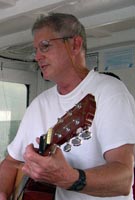
Former Professor and Project Manager
Describe your work and research:
“I am a university professor and research scientist. I teach undergraduate and graduate-level classes in ichthyology, anatomy, and evolution. I advise and direct the research of graduate students. I participate in the research of my students and conduct my own research dealing with fish ecology and evolution. My main interest at present has to do with studying sharks and rays. I spend time in the field studying behavior and reproduction, and I spend time in the lab analyzing samples and data. A significant amount of time is spent writing scientific papers, reports, and grant proposals to fund research projects.”
My motto to live by:
“Try to learn something new every day.”
How did you become interested in ichthyology?
“As a child and teenager, I was involved in fishing, hunting, and other outdoor activities. My first interest in college was in wildlife biology, but a part-time job at the state museum in North Carolina sparked my interest in fish. I was asked to participate in a stream survey and identify and catalog all of the fishes we caught. After that, I was hooked.”
What training and education do you have?
“I have a BS degree in Zoology from NC State University and a PhD from Cornell, with a specialization in ichthyology and evolutionary biology.”
What personal qualities are important in this field?
“A love of water and fish, fascination with nature, natural curiosity and inquisitiveness, self motivation, a good work ethic, and a good sense of humor.”
Describe your work and research:
“I am a university professor and research scientist. I teach undergraduate and graduate-level classes in ichthyology, anatomy, and evolution. I advise and direct the research of graduate students. I participate in the research of my students and conduct my own research dealing with fish ecology and evolution. My main interest at present has to do with studying sharks and rays. I spend time in the field studying behavior and reproduction, and I spend time in the lab analyzing samples and data. A significant amount of time is spent writing scientific papers, reports, and grant proposals to fund research projects.”
What skills do you use on the job?
“The most important skills I use are statistics for data analysis, computer skills for recording, analyzing, and presenting data, and written and verbal skills for effective communication. I can’t over-emphasize the importance of good speaking and writing skills to a career in science.”
What interesting discoveries have you made in your studies?
“I have discovered and named new species of fish and my students and I have discovered and described new ways that stingrays reproduce.”
What is your typical work schedule?
“I do not have a set schedule. While teaching, my class schedule dictates when I am on campus. I teach some classes during the day, others in the evening.”
“Research studies in the field often require that I be out on the water for a week or more at a time, often working both day and night and on weekends. When I’m working in the laboratory, I usually work a typical 8-5, M-F schedule, but I often work at home when I need to concentrate on reading or writing. ”
What do you like best about your job?
“The pleasure of being around and working with intelligent, motivated people who are interested in the same topics as I am. I like the adventure and excitement of doing new things in the field, for example capturing sharks and going down in research submarines. I also enjoy going new and exotic places to study fish. I also enjoy the flexible hours and the fact that in many respects, I am my own boss. It is also very rewarding to work with and mentor dedicated students.”
Does this profession require any travel?
“Travel is required, but the amount and duration of travel is very variable. Some travel is related to field research and sampling, some is related to going to meetings and conferences to present the results of studies and learn what others in the field are doing.”
What is the general salary range for someone in your position?
“$50,000 to $70,000/year”
How long have you been an ichthyologist?
“40 years”
Is it difficult to find a job in ichthyology?
“It is not easy. You have to have strong credentials and be clearly better qualified than others to land a good job in the field.”
Have you ever considered a career in a different field?
“I considered being a rock & roll star, but I can’t play guitar or sing that well. Other than that, I can’t imagine doing anything I would like more.”
Do you ever go fishing in your free time?
“I love to go fishing but I don’t seem to have much free time any more. However, I expect to do some serious fishing when I retire. By the way, being a good ichthyologist does not necessarily make you a good angler!”
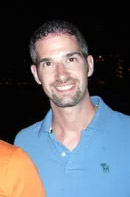 Griffin Sheehy
Griffin Sheehy
Former Laboratory Technician
How did you become interested in ichthyology?
“As a child, I was always fascinated by aquatic animals and spent most of my summer days fishing and exploring local creeks.”
What training and education do you have?
“I have a Bachelors degree in biology from the College of William and Mary. Although my degree was in general biology, I tailored my studies to include many marine biology classes.”
What personal qualities are important in this field?
“To be involved with field and laboratory research a scientist needs to be dedicated. Sometimes lab work can be time-consuming and tedious which requires patience. A scientist must be willing to get his or her hands dirty. Many times fieldwork must be completed under very demanding conditions such as extreme heat or cold, rain and even under water.”
Describe your work and research:
“I work with a group of scientists working with catfish. We are trying to identify all the unknown catfish species in the world. Working in a museum environment also involves sorting/identifying specimens as well as general collection maintenance.”
What skills do you use on the job?
“I use many computer skills necessary for entering data, creating databases and searching for information. I need to have strong communication skills because I interact with scientists from all over the world. I also use scientific literature to help identify fish specimens.”
What interesting discoveries have you made in your studies?
“I learn more about fishes everyday. My job involves finding catfish that no one has ever discovered before. One day, those catfish will be published in a field guide to help other students and researchers identify specimens they collect.”
What is your typical work schedule?
“I work from 8 am to 5 pm, Monday through Friday. Occasionally our lab goes on day-long collecting trips where we visit local streams and lakes to catch fish that will be deposited in our Museum Fish Collection.”
What do you like best about your job?
“Everyday, more and more species of plants and animals disappear from our world forever due, in part, to human influences such as pollution. My favorite part of my job is knowing that I work in a museum where we inventory as much life on this planet as possible. In the ichthyology Department we want to preserve as many different fish species as possible so that future generations will know what animals lived in their local waters. It is wonderful to think that I am helping to raise conservation awareness and document our precious natural resources before they are gone.”
Does this profession require any travel?
“A career in ichthyology often requires travel to field stations that could be located in foreign countries. Travel is often to remote areas with few modern conveniences or luxuries. An ichthyologist must be willing to go wherever the fish he is studying happen to live.”
What is the general salary range for someone in your position?
“Anywhere from $20,000 to $30,000 a year.”
How long have you been an ichthyologist?
“I have worked with fish since 2002 but I have worked with aquatic ecosystems since I graduated from college in 2000.”
Is it difficult to find a job in ichthyology?
“Many times it is necessary to relocate to a city or state close to water to find a job. Sometimes it is difficult to find a job with only a Bachelor’s degree. Schooling up to the Master’s degree level opens up many more career opportunities. It is a competitive field requiring hard work but there is no reason anyone couldn’t have a successful and rewarding career in ichthyology!”
Have you ever considered a career in a different field?
“I have many interests related to biology and have thought of pursuing them in the past. There is no way of knowing what the future holds for me but I know that ichthyology will always remain an important part of my life.”
Do you ever go fishing in your free time?
“I rarely go fishing unless I am participating in a research cruise or collecting field trip.”
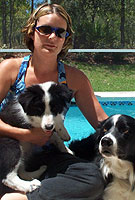 Cathy Bester
Cathy Bester
Former Education Coordinator
Florida Museum of Natural History
How did you become interested in ichthyology?
“I always had a strong interest in the outdoors, nature, and wildlife which eventually led to my decision to pursue a career in marine biology. Throughout my childhood, I spent most of my time outdoors, observing and learning as much as possible about wildlife.”
What training and education do you have?
“I attended Bowling Green State University (Ohio) for my undergraduate degree in marine biology. During my final year as an undergraduate, I worked in Belize (Central America) during the summer. I went on to work at the Bermuda Biological Station for Research on a coral symbiosis research project which eventually led to my Masters degree thesis research. Since earning my Masters degree, I have taken a variety of positions including teaching at a university and a community college as well as my current position at the Florida Museum of Natural History as Education Coordinator.”
What personal qualities are important in this field?
“In the field of ichthyology (as well as other biological sciences), it is important to have scientific integrity, strong ethics, and a good sense of reasoning. You must also be able to get along well with fellow biologists since you often work as part of a team on various projects.”
Describe your work and research:
“Currently, my work consists of many different responsibilities. As Education Coordinator, I am working on education initiatives which include Project Shark Awareness, a public outreach program that seeks to educate people about the myths and realities of sharks. I am also responsible for the web site development and maintenance, which includes programming and digital photography. In the past, I have worked on coral symbiosis research that focused on the cellular mechanisms of communication between corals and their symbiotic algae.”
What skills do you use on the job?
“I use a variety of skills in my position at the Museum. My education in marine biology along with my teaching experience has prepared me well for my current job. Computer skills are very important. As the web site designer, I need skills for web page creation which includes knowing many software programs such as html editors and graphics programs. I also use my biological science knowledge for creating new web page content and educational materials. Photography and writing are very important skills that I use everyday.”
What interesting discoveries have you made in your studies?
“During my research as a graduate student, I discovered that symbiotic algae found in corals take up amino acids provided by the coral host and the role this may play in communication between these two organisms. Recently, I have discovered how much people really want to learn about fish, especially sharks. This has lead to the development of our education initiatives on sharks, shark biology, and shark conservation at the Florida Museum of Natural History.”
What is your typical work schedule?
“I work 40 hours a week in the office with occasional travel to conferences and workshops.”
What do you like best about your job?
“My job provides opportunity to develop educational materials for classrooms and the general public. These materials are available through our web site for the general public to learn more about fish! Education is a great way to increase public awareness about the wildlife, natural habitats, and conservation.”
Does this profession require any travel?
“My position as education coordinator requires some travel, primarily to conferences and workshops to meet other educators and to share ideas and information about education initiatives.”
What is the general salary range for someone in your position?
“The general salary range for someone in my position ranges anywhere from $30,000 to about $50,000 per year depending upon your employer, education, geographical location, and job responsibilities.”
How long have you been an ichthyologist?
“I have been working in the field of marine biology for about 10 years.”
Is it difficult to find a job in ichthyology?
“It can be difficult to find a job in this field due to the high amount of competition for the best positions. If someone asked me for advice on entering this field, I would tell them to work hard to earn top grades and to get lots of experience working on different research and education projects while in school. It also helps to have a graduate-level degree when searching for a position in ichthyology.”
Have you ever considered a career in a different field?
“I have considered careers in different fields, however I decided to become a marine biologist. Originally I studied photojournalism, but later changed my career goals. It would be fun to rent kayaks, take people out on field trips and teach them about the habitats and wildlife of Florida.”
Do you ever go fishing in your free time?
“I occasionally go fishing in my free time. Gainesville is centrally located in the northern peninsula of Florida, giving easy access to both the Atlantic and the Gulf coasts. When I do get a chance to do some fishing, it is mostly in saltwater and from my ocean kayak.”
 Travis Ford
Travis Ford
Former Lead Shark Fishery Observer
& Lab Technician
at the Florida Museum of Natural History
How did you become interested in ichthyology?
“I became interested in ichthyology when I was a child growing up in South Florida, but I did not get started in the field until college. In the summer of 2001, I began to volunteer in the Ichthyology Department at the Florida Museum of Natural History. This rekindled my interest in fishes and the ocean.”
What training and education do you have?
“I have a B.A. in Environmental Science with minors in Natural Resource and Environmental Ethics, Agricultural Law, and a concentration in Food and Resource Economics. I am a certified Dive Master and a trained commercial shark fishery observer.”
What personal qualities are important in this field?
“In my line of work it is very important to be able to work well with others, even people you have never met before. Organization and the ability to multi-task are also valuable qualities since it is often hectic on fishing vessels. Having a flexible social calendar is beneficial. In addition, it is imperative to have a love for the environment and conservation, while maintaining the desire to perform your best and be successful.”
Describe your work and research:
“About 25% of my time is spent at sea collecting biological samples and data on commercial shark fishing vessels. This involves going out on commercial shark fishing vessels for days at a time. When the fishermen catch sharks, I identify the species, measure the animals, and take samples, i.e. reproductive organs, vertebrae, jaws, and liver samples. This data is then brought back to the lab, along with the samples, where it is catalogued for future studies.”
What skills do you use on the job?
“Knowing how to handle a knife is a skill that is beneficial at sea. Organizational skills are very useful on a boat as well. In the lab it helps to know the ins and outs of Microsoft Word, Microsoft Access, and how to search for information on the internet.”
What interesting discoveries have you made in your studies?
“I haven’t made any astonishing scientific breakthroughs…yet.”
What is your typical work schedule?
“Monday through Friday 8:00am to 5:00pm. However, when I am out fishing work days can be longer, and they often include weekends.”
What do you like best about your job?
“I like splitting my time between the lab and the field. I am never cooped up the office for too long, but at the same time I am never stuck on a boat for very long. Also, the people that I work with are all very unique and fun to be around. There is always someone who is willing to answer a question or help you find the answer. This makes the work place exciting and educational.”
Does this profession require any travel?
“Yes, there is a lot of travel all around the southeast coast of the United States.”
What is the general salary range for someone in your position?
“Approximately $30,000.”
How long have you been an ichthyologist?
“I began to study ichthyology in 2001.”
Is it difficult to find a job in ichthyology?
“It is not difficult to find a job if you are willing to work in any area of ichthyology.”
Have you ever considered a career in a different field?
“I wanted to be a roadie for AC/DC, but they were not hiring.”
Do you ever go fishing in your free time?
“Yes. I like to fish for dolphin (mahi), grouper, and snapper.”
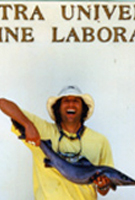 Robert Buch
Robert Buch
Former Assistant Data Manager, International Shark Attack File
at the Florida Museum of Natural History
How did you become interested in ichthyology?
I became interested in the marine world when I was doing my certification dives for my SCUBA certification (16 years ago). I became interested in ichthyology as a career when I took an Oceanography course in college.
What training and education do you have?
I have a B.S. in Zoology and an M.S. in Marine Science.
What personal qualities are important in this field?
I think that it is important to be able to work well with others. Much of the field involves collaboration and working with other scientists. I think it is important to be relentless in your approach to your studies. Opportunities and money are very difficult to come by, so it’s important to really “stick with it”. It is also important to be able to juggle a couple of different things at once, or multitask.
Describe your work and research:
My current work entails assisting in the management of the International Shark Attack File.
My graduate research dealt with the systematics (specifically the taxonomy) of a deep-sea shark.
What skills do you use on the job?
A skill which I’ve noticed is important in all the jobs I’ve had in this field (including this one) is organization. It’s important to be able to work well with others. It’s important to be resourceful, diligent, focused, and flexible.
What interesting discoveries have you made in your studies?
I discovered a new species of deep-sea shark.
What is your typical work schedule?
My typical work schedule is 8-5 M-F in the lab/office.
What do you like best about your job?
The people. I’m surrounded by so many intelligent and interesting co-workers.
I also really enjoy the subject of my work. I think it’s important to do for a living (M-F) what you want to do as a hobby on your days off.
Does this profession require any travel?
Some jobs in the profession can require quite a bit of travel. My current position requires no travel.
What is the general salary range for someone in your position?
Positions such as this can expect to earn 20-30K. This depends heavily on education and the type of institution you work for.
How long have you been an ichthyologist?
I began my education as an ichthyologist as an intern (at Mote Marine Lab) about 10 years ago.
Is it difficult to find a job in ichthyology?
I think so. A lot of it depends on your connections within the field and your flexibility with regards to relocation. But there seem to be a lot more marine biologists than there are marine biology jobs.
Have you ever considered a career in a different field?
As an undergraduate I considered a career in medicine.
Do you ever go fishing in your free time?
I don’t fish much anymore (I used to fish quite a bit).
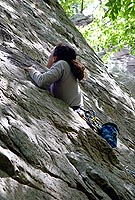 Alexia Morgan
Alexia Morgan
Former Commercial Shark Fishery Observer Program Coordinator
Florida Museum of Natural History
How did you become interested in ichthyology?
“I read a book by Eugenie Clark called “Shark Lady” when I was around 9 years old. The ocean had always fascinated me but up until that point I had only read and had experience with marine mammals. This book opened my eyes to ichthyology and in particular the study of sharks and other elasmobranchs. A woman scientist wrote the book, which was a bit more meaningful to me being a young girl at that time.”
What training and education do you have?
“I have a Bachelors degree in biology, a Masters degree in marine biology, and am currently working on my Ph.D. in fisheries. I have been trained in marine safety, first aid and CPR, acoustic tracking, attaching acoustic transmitters to young sharks, inserting PIT tags into sharks and sea turtles, gillnet and longline fishing, marine mammal, fish and sea turtle identification, data collection at sea, biological sampling, data entry into a computer database, and sea turtle resuscitation techniques.”
What personal qualities are important in this field?
“I think one of the top skills needed to make it in this field is determination. It can take many years of school and non-paid internships before you actually secure a job you enjoy. It can be easy at any time during this process to give up and take a job that pays more for less education. Individuals need to be hard working, dependable, honest and have a thick skin. Giving your first presentation in front of your peers can be a very intimidating experience and most scientists are not afraid to let you know if your project is not very good.”
Describe your work and research:
“Currently I work in several areas. My primary work is coordinating the Commercial Shark Fishery Observer Program. This program sends trained biologist to sea on commercial bottom longline fishing vessels that target large coastal sharks from New Jersey to Louisiana. I am in charge of hiring the observers, training them in marine safety and data collection, monitoring the database, which houses all of the information they collect at sea, and assigning them to vessels. In addition I help write final reports for the granting agency, write proposals for funding and analyze the data for publications. My other position in the office is as an assistant for the International Shark Attack File, which house information on all known shark attacks worldwide. I monitor the progress of data collection and entry, and victim interviews. I also provide information on shark attacks to the media, scientists and general public. Outside of the office I am currently working on my Ph.D. in fisheries. I am using statistical modeling as an approach to determine the effects of time area closures and gear modifications on the dusky shark population of the Northwestern Atlantic Ocean. This mostly involves quantitative skills, an understanding of the dusky shark population and factors that effect this species vulnerability.”
What skills do you use on the job?
“I work on the computer all day long when I’m in the office. I have to know how to use Access database, Microsoft word and excel. There is a lot of data crunching, database monitoring, writing final reports, calling up boat captains to set up trips and communicating with the observers during the fishing season. When I go to sea I collect fishery and catch specific data including species identification and morphological information.”
What interesting discoveries have you made in your studies?
“There are always interesting discoveries when you work with marine life. I have seen some fascinating things at sea and meet some truly unique individuals. I have also learned a lot about people by talking to victims and witnesses of shark attack.”
What is your typical work schedule?
“In the office it’s the usual 8-5 routine and then schoolwork at night. At sea the hours are much different. You can wake up as early as 3 am to haul back the fishing gear and be back in your bunk by 9 am for a short nap. Working at sea is much more strenuous and the hours you are working vary drastically depending on the fishing gear being used and the amount of catch associated with a single set.”
What do you like best about your job?
“I enjoy “crunching” the data collected both through the Commercial Shark Fishery Observer Program and the International Shark Attack File. However I also enjoy going out to sea, but this has happened much less frequently since I went back to school.”
Does this profession require any travel?
“I get to travel several times a year for my job. This is usually to attend meetings, conferences and training sessions. Its one of the better perks about working in observer programs, everyone loves to travel so there are usually a few meetings in different locations every year.”
What is the general salary range for someone in your position?
“For a coordinator in an observer program a salary can range from $30-45k/year. As you become more involved in the observer programs and take on more responsibility in the development of the program etc you can increase your salary.”
How long have you been an ichthyologist?
“I’m not really sure how to define that. I’ve been reading and studying fish on my own since I was young but never really did anything with scientists until I graduated from college.”
Is it difficult to find a job in ichthyology?
“If you do not have a specific animal you want to work with it is a lot easier to find a job. If you only want to work with sharks or gobies for example, you will be limiting your job options. There are a lot of research assistant jobs, observer positions etc. for recent college graduates. As you narrow your interest level you begin to lose job opportunities but gain the possibility to work on some really unique and interesting projects as you gain more skills.”
Have you ever considered a career in a different field?
“Only on really bad days and not for very long. While I have never changed my mind on working with sharks, my area of research has changed from behavior to genetics to fisheries management. The most difficult thing for me was finding out exactly what it was about sharks I wanted to study. I found the solution was trying out several different areas before I determined exactly what type of research suited my skills and interests.”
Do you ever go fishing in your free time?
“I’m a vegetarian.”
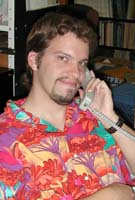 Andrew Piercy
Andrew Piercy
Former Research Biologist
Florida Museum of Natural History
How did you become interested in ichthyology?
“I can not pinpoint any one event or time that triggered my interest in sharks, but it probably started when I was an elementary student. I also had an excellent high school biology teacher who helped foster my interest in science.”
What training and education do you have?
“I have a Master’s Degree in Biology from University of Central Florida and a Bachelor’s of Science in Biology from Christopher Newport University. I am currently a Ph.D. student at the University of Florida, Department of Fisheries and Aquatic Sciences.”
What personal qualities are important in this field?
“Self motivation, ability to focus on tasks, good written and oral communication skills, physically fit (for field work), and an ability to learn and adapt, are all important qualities in this field.”
Describe your work and research:
“My research interests are focused on primarily two interrelated areas of shark biology; reproduction and age and growth. I am involved with several age and growth projects on sharks, such as the scalloped hammerhead. The goal of these projects is to determine how fast scalloped hammerheads and other sharks grow with particular interest on determining the age of maturity. I am also involved with reproductive studies on stingrays and sharks, such as the sandbar shark. These studies are trying to answer questions about their reproduction. For instance, how often do they reproduce, when does mating occur, how many young are born, etc… These data are important for determining how shark populations will respond to fishing pressure.”
What skills do you use on the job?
“I use communication (oral and written), teaching, dissection, microscopy, and organization skills on a daily basis. I also utilize research training in histology and ageing.”
What interesting discoveries have you made in your studies?
“Yes, but I can’t tell you until its published.”
What is your typical work schedule?
“7 am to 5pm Mondays through Friday with occasional longer days and weekend work in the field. Field trips are typically 3-4 days on a commercial shark-fishing vessel off the coast of Florida.”
What do you like best about your job?
“This job allows me to interact with and teach students and volunteers, and learn new things through scientific research.”
Does this profession require any travel?
“Sometimes. You may need to do field work to collect samples which can require travel and many scientists attend national meetings and conferences to present their work to their peers.”
What is the general salary range for someone in your position?
“Depends on level of education and skills. I would say the salary range would be $20,000 to $30,000 for my current position.”
How long have you been an ichthyologist?
“I have been involved with research on sharks, skates, and rays since my senior year in high school (1994).”
Is it difficult to find a job in ichthyology?
“Depends on who you know. The best advice I can give is to network. Meet and interact with scientists in similar fields of interest. You often will hear about potential jobs through friends and colleagues.”
Have you ever considered a career in a different field?
“Yes, I briefly considered a career in the FBI. I think I was watching too much X-Files at the time.”
Do you ever go fishing in your free time?
“Sometimes. I used to fish more when I was growing up, but I would say I probably fish a handful of times a year outside of work.”
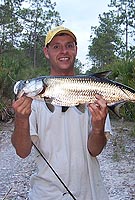 Jason Seitz
Jason Seitz
Former Fish Collection Technician
Florida Museum of Natural History
How did you become interested in ichthyology?
“Put simply: fishes have always held my interest both in their mysterious ways and in their incredible adaptability.”
What training and education do you have?
“Education: Bachelor of Science in Biology, State University of New York at Brockport; Associate of Applied Science in Fisheries Technology, SUNY at Cobleskill. Additional graduate-level courses: Environmental Research Methodology, Scientific Writing
“Training: Advanced SCUBA Certification, Red Cross CPR/Basic First Aid, Boating Safety Certification, Cetacean Stranding and Salvage Training, GIS/GPS Processing Hardware and Software Training, Basic Fire Training, Pesticide Application License and Certification, Shorebird Ecology and Management Workshop”
What personal qualities are important in this field?
“Besides a working knowledge of some aspect of fish biology, other important personal qualities include well developed observational skills, good interpersonal skills, and diligence.”
Describe your work and research:
“In addition to my continued research on the ecology of the smalltooth sawfish, Pristis pectinata, I help curate the FLMNH ichthyology collection.”
What skills do you use on the job?
“Fish identification, computer and database skills, familiarity with the literature, knowledge of chemicals used in curating fishes, logistics, etc.”
What interesting discoveries have you made in your studies?
“My research on the smalltooth sawfish has revealed some interesting clues to its natural history, including the regular use of deep water refuges for large sawfish, and clues to critical mating and birthing habitats.”
What is your typical work schedule?
“I generally work about 40 hours per week at the office or in the field. In addition, some weekends or weekday evenings are spent working on manuscripts or presentations.”
What do you like best about your job?
“There is always something more to learn about any aspect of ichthyology, and that fact keeps me excited at my job.”
Does this profession require any travel?
“Travel is not generally required, unless it is part of your job description. Occasionally, you may attend a seminar or go to a symposium perhaps in another state or outside the country, and you may get the chance to do field work far away from your home. Generally speaking, if you wish to stay close to home, you can do so.”
What is the general salary range for someone in your position?
“There is a wide range of salaries in this profession. It depends on who your employer is, and whether you have a supervisory position, can obtain lots of grant funding, how well recognized you are as a professional, etc. Starting salary may range from $20,000 to $35,000 yearly, and may not initially offer benefits. It helps to be budget-minded, and you may need to make some sacrifices in your pursuits during your free time.”
How long have you been an ichthyologist?
“I prefer the term Marine Biologist, since I have worked with other marine organisms besides fishes. I’ve been in this general field for more than ten years.”
Is it difficult to find a job in ichthyology?
“Generally, yes. However, it pays for an individual to be relentless in his/her pursuit of this career choice, and to not let friends or family members tell you different or stand in your way. Always listen to your heart when it comes to picking a profession. Once your chosen path is illuminated, let nothing stand in your way. Do not give up or compromise.”
Have you ever considered a career in a different field?
“When I was in high school, I thought I could always own a pet shop specializing in aquarium fishes and reptiles, if I didn’t make it as a fish researcher. Once I entered the field of marine biology however, I knew I would stay there.”
Do you ever go fishing in your free time?
“Absolutely! I fish every chance I get. Both fresh and saltwater. Fish researchers get an added kick out of fishing: not just is it a challenge to hook and successfully land a fish on angling tackle, but once you get it alongside the boat, you enjoy the chance to observe the species in its natural habitat.”